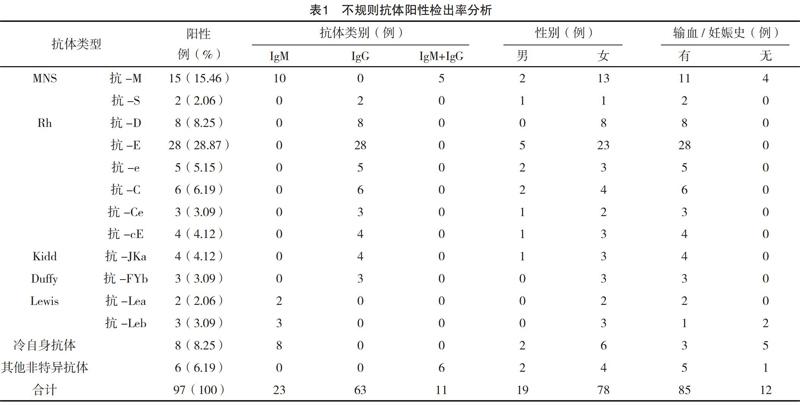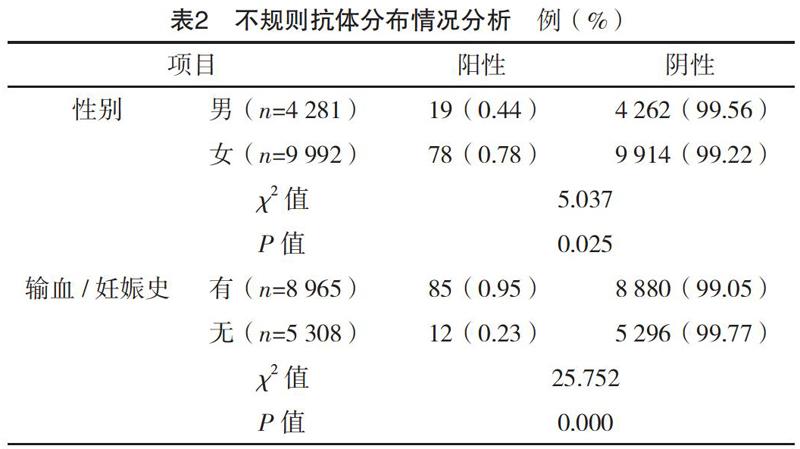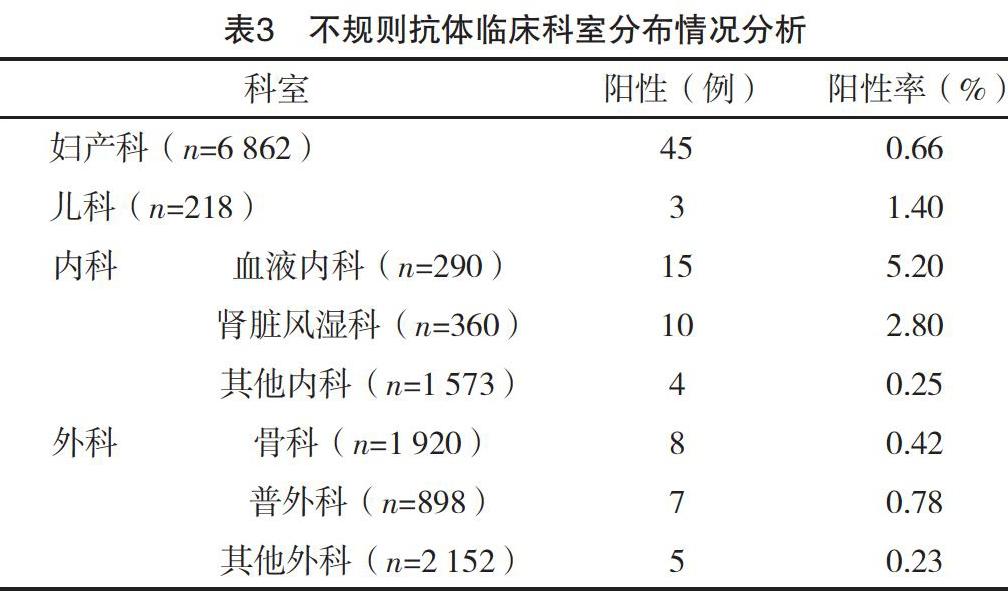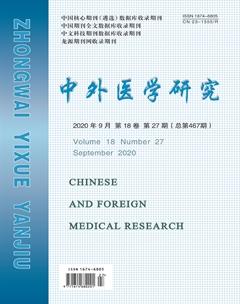14 273例拟输血患者不规则抗体筛查结果分析
杨晓明 陈上卿 蒋晓玲



【摘要】 目的:對拟输血患者用微柱凝胶法筛检不规则抗体检出及分布情况进行分析。方法:选取14 273例拟输血患者作为研究对象,均采用微柱凝胶法筛检不规则抗体,其中,阳性患者均采用谱细胞进行抗体的特异性分析。结果:14 273例患者中,检出97例患者存在不规则抗体,阳性检出率0.68%(97/14 273)。其中,MNS系统中共有17例患者,占比17.53%(17/97);Rh系统中共有54例患者系统中共有54例患者,占比55.67%(54/97)。免疫球蛋白M(IgM)类中有23例患者,占比23.71%(23/97);免疫球蛋白G(IgG)中有63例患者,占比64.95%(63/97);IgM+IgG有11例患者,占比11.34(11/97)。14 273例患者中,筛查4 281例男性,19例阳性,阳性率为0.44%(19/4 281);筛查9 992例女性,78例阳性,阳性率0.78%(78/9 992),女性不规则抗体阳性检出率高于男性,差异有统计学意义(字2=5.037,P<0.05)。85例有输血/妊娠史患者,阳性检出率0.95%(85/8 965),12例无输血/妊娠史患者,阳性检出率为0.24%(12/5 308),有输血/妊娠史患者规则抗体阳性检出率相高于无输血/妊娠史患者,差异有统计学意义(字2=25.752,P<0.05)。不规则抗体阳性患者临床科室分布,血液内科占比最高,阳性检出率为5.20%(15/290),其次为肾脏风湿科,阳性检出率为2.80%(10/360)。结论:抗体筛查阳性的不规则抗体性质以同种免疫产生IgG抗体为主,最常见为Rh系统抗体,其中以抗-E最多;有输血史和妊娠史的患者检出率更高;女性检出率高于男性;血液内科、肾脏风湿科的患者检出率较高。应对拟输血的患者进行不规则抗体筛选,从而有助于降低患者溶血性输血反应及预防新生儿溶血病,提高输血有效性安全性和保障母婴安全。
【关键词】 输血安全 不规则抗体 微柱凝胶法
doi:10.14033/j.cnki.cfmr.2020.27.067 文献标识码 B 文章编号 1674-6805(2020)27-0-04
[Abstract] Objective: To analyze the detection and distribution of irregular antibody in blood transfusion patients by microcolumn gel method. Method: A total of 14 273 patients with blood transfusion were selected as the research objects. The irregular antibody were screened by microcolumn gel method. Spectral cells were used to analyze the specificity of antibody in all positive patients. Result: Among the 14 273 patients, 97 patients had irregular antibody, and the positive detection rate was 0.68% (97/14 273). Among them, there were 17 patients in MNS system, accounting for 17.53% (17/97). There were 54 patients in Rh system, accounting for 55.67% (54/97). There were 23 patients with immunoglobulin M (IgM), accounting for 23.71% (23/97). There were 63 patients with immunoglobulin G (IgG), accounting for 64.95% (63/97). There were 11 patients with IgM+IgG, accounting for 11.34 (11/97). Among the 14 273 patients, 4 281 males were screened, 19 were positive, the positive detection rate was 0.44% (19/4 281). Among the 9 992 female screened, 78 were positive, the positive detection rate was 0.78% (78/9 992). The positive detection rate of irregular antibody in female was higher than that in male, and the difference was statistically significant (字2=5.037, P<0.05). A total of 85 patients with blood transfusion/pregnancy history, the positive detection rate was 0.95% (85/8 965), 12 patients without blood transfusion/pregnancy history, the positive detection rate was 0.24% (12/5 308). The positive detection rate of regular antibody in patients with blood transfusion/pregnancy history was higher than that in patients without blood transfusion/pregnancy history, and the difference was statistically significant (字2=25.752, P<0.05). Distribution of clinical departments of irregular antibody positive patients: hematology department accounted for the highest proportion, the positive detection rate was 5.20% (15/290), followed by renal rheumatism department, the positive detection rate was 2.80% (10/360). Conclusion: Antibody screening positive irregular antibody nature of IgG antibody, the most common is the Rh system antibody, of which anti-E is the most. Patients with a history of blood transfusion and pregnancy has higher detection rates. Female detection rate is higher than male. The detection rate of patients with hematology and renal rheumatism department is higher. Irregular antibody screening should be carried out for patients to be transfused, so as to help reduce hemolytic transfusion reaction of patients and prevent hemolytic disease of newborn, improve the efficacy and safety of blood transfusion and ensure the safety of mother and child.
Rh系统外检出抗体最常见的是抗-M,检出15例,占15.46%。抗-M多为IgM性质,可天然产生,在室温鉴定抗体时常发生凝集反应,而在37 ℃常无反应,一般不引起溶血性输血反应,但本次研究发现有5例同时含有IgM和IgG性质的抗体,经调查这5例患者输血史发现均在2~5个月前有输注过红细胞3~8单位,而之前不规则抗体筛查均阴性,因此可判定是近期随机输入M抗原阳性的红细胞免疫刺激产生的同种抗体,由于抗原刺激时间较短,所以可同时在体内检出IgM和IgG性质的抗体。IgG性质的抗-M也可引起血管外溶血,因此在檢出抗-M时要区分抗体性质,M抗原阴性的患者最好输注M抗原阴性的血液。Lewis系统抗体和冷自身抗体多为IgM性质,引起的输血反应应较少,但多会引起血型正反定型不符,交叉配血不合,因此要加以区分,避免同时含有同种抗体。在混合型的自身免疫溶血性贫血的患者中多含有抗体特异性不明确具有IgM和IgG性质的自身抗体,该类型患者尽量避免输血,以药物治疗为主,如病情危急,应权衡输血的利弊,以患者生命安全为主。
不规则抗体阳性患者在临床科室的分布特点:内科以血液内科和肾脏风湿科为主,阳性率5.20%和2.80%,高于其他内科的0.25%。因为血液科白血病人多需要长期反复输血,容易刺激产生同种抗体;肾脏风湿科检出的多为自身免疫抗体,因此检出率较高。外科患者以骨科和普外科为主,阳性率为0.42%和0.78%,高于其他内科的0.23%。因为骨科和普外科阳性患者检出的特点多为有手术史和输血史,当再次手术输血时不规则抗体检出率较高。妇产科不规则抗体阳性率为0.66%,检出率较高是因为女性患者除输血免疫风险外多了妊娠免疫的风险,而且妊娠的次数越多风险越高。本次儿科检出不规则抗体3例,可证实是由母体通过胎盘传过来的IgG抗体,因此不规则抗体筛查对预防新生儿溶血病有重要意义;儿科阳性率为1.40%,比其他科室较高是因为只针对218例有黄疸、贫血需输血/备血的患儿进行筛查,调查基数较小,因此阳性率较高。
综上所述,抗体筛查阳性的不规则抗体性质以同种免疫产生IgG抗体为主,最常见为Rh系统抗体,其中以抗-E最多,最具有临床意义;有输血史和妊娠史的患者阳性率更高,女性因增加妊娠免疫的风险,检出率高于男性;血液内科、肾脏风湿科的患者因需要长期反复输血或患自身免疫性疾病,所以检出率较高。因此应对拟输血/备血的患者进行不规抗体筛查,从而有助于降低患者溶血性输血反应及预防新生儿溶血病,提高输血有效性安全性和保障母婴安全。
参考文献
[1]张勇萍,杜娟,杨世明,等.4397例孕产妇ABO和RhD血型检测及不规则抗体的分析[J].细胞与分子免疫学杂志,2016,32(5):680-682.
[2]刘培贤,贾洪娟,刘志鹏,等.Rh血型系统抗原检测对临床安全合理输血的重要性分析[J].世界中西医结合杂志,2017,12(10):1415-1417,1421.
[3]梁宝华,黄燕芬,郑博金,等.输血前不规则抗体筛查在避免免疫溶血性输血反应中的预防效果分析[J].检验医学与临床,2019,16(13):1880-1882,1885.
[4]张婷婷.溶血性输血反应与非ABO新生儿溶血病不规则抗体的临床分析[J].世界临床医学,2017,11(6):135,137.
[5]王淑平,陈慧芬,李志强.孕妇ABO血型系统以外不规则抗体致新生儿溶血病10例[J].临床输血与检验,2017,19(4):340-342.
[6]吴玉敏,赵志红.60例不规则抗体阳性患者特异性抗体和病种分布及临床意义[J].白求恩医学杂志,2017,15(2):170-171.
[7]吴迪.9013例输血者不规则抗体筛查结果及意义[J].首都医科大学学报,2017,38(5):753-757.
[8]李丽群.临床输血患者不规则抗体的分布特点及意义分析[J].基础医学论坛,2019,23(34):4978-4979.
[9]葛艳玲,刘英.RhE抗原检测及同型输注在临床输血中的意义[J].临床血液学杂志,2018,31(2):137-138.
[10]朱英哲,张可莹,赵金辉.输血患者E抗体的产生[J].北京医学,2017,39(2):190-191.
[11]刘亚庆,刘素芳,闫芳,等.Rh血型系统抗CE复合抗原抗体的研究[J].北京医学,2012,34(2):134-137.
[12]孙长杰,王晓宁,刘冰,等.抗-cE合并抗-c、抗-E抗体致新生儿溶血病的临床研究[J].中国实验诊断学,2016,20(11):1911-1913.
(收稿日期:2020-07-14) (本文编辑:桑茹南)

